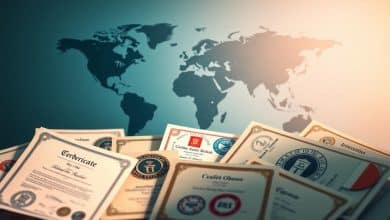Leadership Skills Every International Student Should Develop
Navigating new academic systems and cultural norms abroad requires more than textbook knowledge. Young adults studying overseas discover that certain abilities help them adapt faster and make lasting impacts. These competencies – often called “soft skills” – prove invaluable across classrooms, workplaces, and social settings.
Building strong interpersonal capabilities allows individuals to bridge cultural gaps and collaborate effectively. Those who cultivate these traits often find it easier to inspire peers, resolve conflicts, and drive group initiatives forward. Such qualities become particularly vital when coordinating teams with diverse perspectives.
Global challenges demand creative problem-solvers who can turn ideas into action. International learners frequently encounter situations requiring quick thinking and emotional intelligence. Mastering these areas prepares them to address complex issues while fostering inclusive environments wherever they go.
Through consistent practice, these adaptable traits grow stronger over time. They serve not just during academic years but throughout one’s career and personal life. By prioritizing this development early, individuals position themselves to seize opportunities in an interconnected world.
Understanding the Importance of Leadership in a Global Context
In an interconnected world, the ability to guide diverse groups becomes a cornerstone of personal and professional growth. Those studying abroad often find themselves bridging cultural divides, where influence matters more than authority. This reality makes cultivating specific traits essential for navigating classrooms, workplaces, and social circles.
Why Direction Matters for Academic Achievement
Learners who embrace roles requiring collaboration often outperform peers in group projects. A 2023 study revealed that individuals with cross-cultural awareness solve problems 40% faster in multicultural teams. These capabilities directly translate to academic success and early-career adaptability.
“Global challenges require minds that see beyond borders. The next generation of trailblazers won’t just manage tasks—they’ll connect worlds.”
Shaping Tomorrow’s Workforce and Societies
Organizations now prioritize hires who demonstrate cultural agility. Consider these workplace demands:
| Trait | Traditional Role | Global Role |
|---|---|---|
| Decision-making | Hierarchical approval | Collaborative input |
| Conflict resolution | Avoiding discomfort | Leveraging diversity |
| Innovation | Local market focus | Cross-border solutions |
These shifts explain why universities now embed group projects with international peers into curricula. Graduates carrying these experiences become assets to employers and catalysts for community progress.
Key Leadership Skills Students Need to Develop for Global Success
Thriving in global environments demands more than academic excellence—it requires adaptable traits that bridge cultural divides. Individuals studying abroad often discover that personal growth stems from overcoming obstacles while connecting with diverse groups. Three core attributes prove particularly transformative in these settings.
Building Resilience, Empathy, and Courage
Resilience lets people recover from setbacks and adjust strategies when plans falter. For example, a learner struggling with language barriers might seek tutoring while maintaining academic performance. This trait turns challenges into stepping stones rather than roadblocks.
Empathy creates deeper connections across cultural lines. Understanding different viewpoints helps build inclusive spaces where varied perspectives drive innovation. Those who master this can mediate conflicts and strengthen team dynamics.
Courage pushes individuals to act despite uncertainties. Whether presenting ideas in a second language or joining unfamiliar social circles, boldness opens doors to new opportunities.
| Trait | Key Benefit | Real-World Application |
|---|---|---|
| Resilience | Adapting to unexpected changes | Overcoming academic setbacks |
| Empathy | Building inclusive teams | Mediating cultural misunderstandings |
| Courage | Expanding personal boundaries | Leading cross-cultural projects |
Mastering Clear Communication and Strategic Planning
Expressing ideas clearly across languages requires sensitivity to nuance. Many find success by pairing verbal explanations with visual aids or gestures. Active listening also plays a crucial role in preventing misinterpretations.
Strategic planning becomes vital when juggling coursework, visa requirements, and social integration. Tools like time-blocking and priority matrices help maintain focus. Successful individuals often allocate specific hours for tasks while leaving room for spontaneous cultural experiences.
Enhancing Communication and Teamwork through Leadership
Global collaboration thrives when individuals can express ideas clearly and unite diverse groups toward shared objectives. Structured programs offer practical environments to refine these abilities while navigating cultural differences.
Developing Strong Communication Skills
Low-pressure settings allow learners to experiment with verbal and non-verbal expression. For instance, mock presentations with peer feedback build confidence in public speaking. Many discover that pairing concise language with visual aids improves clarity across language barriers.
Active listening proves equally vital. Noticing tone shifts or body language helps interpret unspoken concerns during group work. One participant noted: “Understanding pauses and gestures often reveals more than translated words.”
Fostering Collaborative Teamwork
Group projects expose varying approaches to problem-solving. Consider how different cultures handle disagreements:
| Aspect | Traditional Approach | Global Approach |
|---|---|---|
| Decision-making | Top-down directives | Consensus-building |
| Conflict resolution | Avoiding confrontation | Open dialogue |
| Innovation | Local solutions | Cross-border adaptation |
These experiences teach participants to mediate differences while valuing diverse input. Over time, teams learn to blend unique perspectives into cohesive strategies.
Such interactions often spark professional connections that endure beyond academic years. Alumni frequently credit these networks with accelerating career opportunities worldwide.
Exploring Leadership Programs and Campus Opportunities
University campuses buzz with activities that extend far beyond lecture halls and textbooks. Structured initiatives help participants gain confidence while addressing real-world challenges through guided experiences.
Benefits of Student Leadership Programs
These programs connect learners with mentors who share industry insights and career strategies. Hands-on projects let participants manage budgets, coordinate events, and solve community issues—skills employers actively seek.
Consider how different involvement options compare:
| Activity | Traditional Involvement | Structured Program |
|---|---|---|
| Mentorship Access | Limited to professors | Industry experts + alumni |
| Skill Development | General teamwork | Conflict resolution + public speaking |
| Career Outcomes | Basic references | Internships + scholarships |
Cultural associations and academic clubs let individuals advocate for community needs while practicing cross-cultural communication. Many institutions now offer specialized tracks addressing visa challenges and adaptation strategies.
Those who get involved often receive personalized recommendation letters highlighting their growth. These resources prove particularly valuable when applying for competitive roles requiring demonstrated initiative.
Cultivating a Leadership Mindset and Personal Accountability
True growth emerges when individuals take ownership of their impact on others. This begins with recognizing how daily choices shape campus dynamics and global relationships. Those who approach interactions thoughtfully often become catalysts for meaningful progress.
Practicing Empathy and Inclusion on Campus
Creating welcoming spaces starts with valuing diverse perspectives. Simple actions make significant differences:
- Inviting quiet peers to share ideas first during discussions
- Attending cultural festivals to learn about traditions
- Asking open-ended questions to deepen understanding
One exchange student shared: “When I asked classmates about their holiday customs, it sparked conversations that lasted all semester.” These efforts help bridge gaps between communities while fostering mutual respect.
Taking Accountability and Advocating for Change
Mistakes become growth opportunities when handled with transparency. A learner might revisit group projects if initial efforts fell short, demonstrating commitment to collective success. Others might address unintended cultural misunderstandings through sincere dialogue.
| Situation | Reactive Approach | Proactive Leadership |
|---|---|---|
| Missed deadline | Blaming technology issues | Creating backup plans early |
| Cultural oversight | Defending intentions | Requesting feedback |
Many find strength in addressing systemic challenges through campus initiatives. Recent campaigns for inclusive housing policies and expanded language resources originated from learners who turned personal experiences into advocacy.
Gaining Real-World Experience and Building Professional Networks
Practical engagement beyond classroom walls shapes future-ready professionals. Immersive projects and cross-cultural collaborations prepare learners to tackle complex challenges while forging connections that transcend borders.
Hands-On Opportunities and Community Impact
Internships and volunteer roles let participants address local issues while showcasing initiative. A food drive organized by learners in Chicago reduced community hunger by 18% while teaching project management. Such initiatives demonstrate problem-solving abilities to potential employers.
| Activity | Skill Developed | Career Impact |
|---|---|---|
| Cultural Fest Planning | Budget Management | Event Coordinator Roles |
| Tutoring Programs | Cross-Cultural Communication | Education Sector Jobs |
| Startup Competitions | Strategic Thinking | Entrepreneurial Ventures |
Connecting Through Guidance and Relationships
Industry veterans often share career insights through structured programs. One alumnus noted: “My mentor’s advice helped me negotiate my first multinational contract confidently.” These bonds frequently evolve into internship offers or collaborative ventures.
“Global talent thrives when guidance meets ambition. Our mentorship initiatives have launched 300+ careers across four continents.”
Effective networking strategies include:
- Attending industry mixers with prepared conversation starters
- Sharing project outcomes on professional platforms
- Scheduling quarterly check-ins with contacts
Participants who combine practical experience with strategic connections often secure roles aligning with their aspirations. These pathways turn academic journeys into launchpads for global impact.
Proven Strategies to Develop and Practice Leadership Qualities
Actions often speak louder than titles when shaping communities. Individuals abroad can cultivate influence through intentional habits and campus engagement, even without formal positions. This approach builds credibility while creating ripple effects that inspire peers.
Leveraging Campus Initiatives and Student Organizations
University clubs serve as training grounds for real-world challenges. Joining sustainability committees or cultural associations lets participants contribute unique viewpoints while gaining hands-on experience. Many find that coordinating event logistics or mediating group discussions sharpens decision-making abilities.
| Involvement Level | Skill Gained | Long-Term Benefit |
|---|---|---|
| Committee Member | Collaborative Planning | Team Coordination |
| Event Coordinator | Budget Management | Strategic Thinking |
| Organization Leader | Conflict Resolution | Crisis Management |
Daily Practices for Continuous Personal Growth
Small consistent actions create lasting change. Preparing thoroughly for seminars demonstrates reliability, while assisting peers with coursework fosters trust. One participant shared: “When I started sharing class notes, others began approaching me for project partnerships.”
Effective development requires regular self-assessment. Setting monthly goals like improving public speaking or expanding cultural awareness helps track progress. Many institutions offer reflection workshops where individuals analyze experiences and adjust approaches.
- Volunteer for group presentation roles
- Schedule weekly mentor check-ins
- Document lessons from intercultural interactions
Conclusion
The journey from classroom learning to real-world impact requires adaptable mindsets and actionable strategies. Those studying abroad who embrace cultural agility often discover their greatest growth occurs through unexpected challenges—miscommunications turned learning moments, or setbacks transformed into collaborative solutions.
Resilience and empathy become daily tools rather than abstract concepts in global environments. Whether coordinating campus initiatives or navigating internships, individuals learn to balance personal accountability with group objectives. These experiences forge professionals capable of turning diverse perspectives into unified progress.
Cross-border collaboration thrives when curiosity meets preparation. Structured programs and spontaneous interactions alike teach participants to listen actively, plan strategically, and adapt swiftly. The traits cultivated today lay foundations for tomorrow’s innovations.
As borders blur in professional and social spheres, these capabilities position learners to excel. The world needs thinkers who bridge gaps—not just through ideas, but through deliberate, inclusive action. Start small, think broadly, and let every interaction shape your capacity to make meaningful contributions.
FAQ
Why is developing resilience important for those studying abroad?
How can joining campus groups improve collaborative abilities?
What role do mentorship initiatives play in professional development?
Which daily habits support ongoing self-improvement?
Why does cultural awareness matter in team settings?
How does advocating for change benefit academic communities?
Published on: 20 de August de 2025







